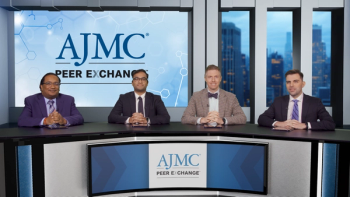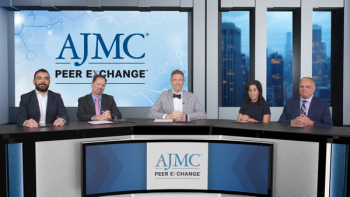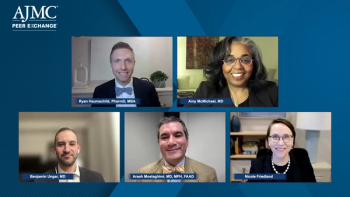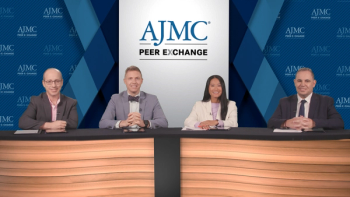
Ryan Haumschild, PharmD, MS, MBA, introduces the faculty and sets the agenda to explore disease background, novel therapies, and operational considerations in relapsed/refractory multiple myeloma.

Ryan Haumschild, PharmD, MS, MBA, introduces the faculty and sets the agenda to explore disease background, novel therapies, and operational considerations in relapsed/refractory multiple myeloma.

Ryan Haumschild, PharmD, MS, MBA, introduces the faculty and sets the agenda to explore disease background, novel therapies, and operational considerations in relapsed/refractory multiple myeloma.

Panelists discuss how community and academic settings differ in applying third-line therapies for metastatic colorectal cancer and how collaboration benefits patients.

Panelists discuss how future RWE should expand to include survival, quality of life, and safety data to improve third-line mCRC care.

Panelists discuss how RWE informs treatment and safety decisions for special populations such as patients with ECOG PS 2 with metastatic colorectal cancer.

Panelists discuss how PROs, particularly tolerability and fatigue, guide shared decision-making for third-line therapy in mCRC.

Panelists discuss how real-world outcomes inform patient conversations and support shared decision-making for third-line metastatic colorectal cancer therapies.

Panelists discuss how RWE helps guide sequencing choices when head-to-head trial data are lacking in third-line metastatic colorectal cancer.

Panelists discuss how efficacy, safety, quality of life, and patient-specific factors drive selection among third-line therapies in metastatic colorectal cancer.

Panelists discuss how data from FRESCO-2 and other trials position fruquintinib as a strong third-line option compared with regorafenib and FTD/TPI.

Panelists discuss how the SUNLIGHT trial and real-world evidence support FTD/TPI with or without bevacizumab as an effective third-line option in metastatic colorectal cancer.

Panelists discuss how available third-line therapies, such as FTD/TPI, regorafenib, and others, are chosen based on survival data, safety, and patient quality of life.

Five experts share their key takeaways from Patient-Centered Oncology Care® (PCOC) 2025, highlighting AI integration and collaboration to improve care.

Panelists discuss their final thoughts on the evolving landscape of alopecia areata (AA) treatment, summarizing key takeaways from the discussion and reflecting on future directions for patient care and therapy advancements.

Panelists discuss how the introduction of Janus kinase (JAK) inhibitor therapies will likely change treatment algorithms for alopecia areata (AA), with insights on how payers should plan for coverage in the coming years and explore the biggest unmet needs for patients with AA and potential improvements in care.

Panelists discuss how the Bayesian network meta-analysis showed which Janus kinase (JAK) inhibitors were most effective in reducing Severity of Alopecia Tool (SALT) scores in alopecia areata (AA), highlighting which therapies achieved 50% and 75% improvement, and whether SALT scores are an effective measure of treatment success.

Panelists discuss how the Bayesian network meta-analysis showed which Janus kinase (JAK) inhibitors were most effective in reducing Severity of Alopecia Tool (SALT) scores in alopecia areata (AA), highlighting which therapies achieved 50% and 75% improvement, and whether SALT scores are an effective measure of treatment success.

Panelists discuss the key safety data observed with each of the three Janus kinase (JAK) inhibitors for alopecia areata (AA), highlighting potential adverse effects and how these impact clinical decision-making.

Panelists discuss how ritlecitinib, approved by the FDA in 2023 as the first Janus kinase (JAK) inhibitor for adolescents with severe alopecia areata (AA), offers distinct properties that make it suitable for younger patients, and how its introduction influences treatment decisions and integration into the AA treatment algorithm, while addressing concerns around drug-to-drug interactions.

Panelists discuss how deuruxolitinib, evaluated in the THRIVE-AA1 and THRIVE-AA2 phase 3 trials, differs from previous Janus kinase (JAK) inhibitors in its formulation and efficacy, and why ensuring long-term patient adherence through 24 weeks is crucial for treatment durability and success.

Panelists discuss how the data from the BRAVE-AA1 and BRAVE-AA2 phase 3 trials demonstrated the safety and efficacy of baricitinib, leading to its FDA approval in 2022 as the first systemic treatment for severe alopecia areata (AA).

Panelists discuss the critical role of effective follow-up and multidisciplinary care in managing hidradenitis suppurativa, emphasizing ongoing patient education, coordinated referrals, and personalized treatment plans to improve adherence and long-term outcomes.

Panelists discuss the importance of clear communication, financial support, and leveraging telehealth and peer networks to improve equitable access and adherence to specialized care and treatment for underserved patients with hidradenitis suppurativa.

Panelists discuss how switching therapies in patients with alopecia areata (AA) is often necessary when initial treatments fail, though it can create a cost burden, and how beyond updated guidelines, there are unmet needs such as improved long-term treatments and better psychological support for patients.

Panelists discuss how the high failure rate of conventional treatments for long-standing, extensive alopecia areata (AA) may be due to factors such as disease chronicity and inadequate response to available therapies, and the need for key updates in AA management guidelines, which have not been revised since 2003.

Panelists discuss the challenges of biologic access in hidradenitis suppurativa due to utilization management policies like step therapy, emphasizing the need for patient education, strategic planning, and leveraging resources—including clinical trials—to improve timely treatment and outcomes.

Panelists discuss the anticipated 2026 updates to the American Academy of Dermatology guidelines for hidradenitis suppurativa, highlighting efforts to unify treatment protocols, support biologic access, and accommodate emerging therapies within a rapidly evolving therapeutic landscape.

Panelists discuss how adverse events associated with conventional therapies for alopecia areata (AA) are monitored through regular patient assessments, and how these events are managed by adjusting treatment or providing supportive care as needed.

Panelists discuss how adherence to conventional therapies for alopecia areata (AA) can be challenging, with adverse effects often impacting patient compliance, and how the most common cause of nonadherence is the lack of visible improvement or perceived efficacy.

Panelists discuss the critical importance of early biologic therapy initiation in hidradenitis suppurativa to prevent irreversible tissue damage, reduce disease burden, and overcome socioeconomic and systemic barriers that delay timely treatment and worsen patient outcomes.

259 Prospect Plains Rd, Bldg H
Cranbury, NJ 08512
© 2025 MJH Life Sciences®
All rights reserved.
